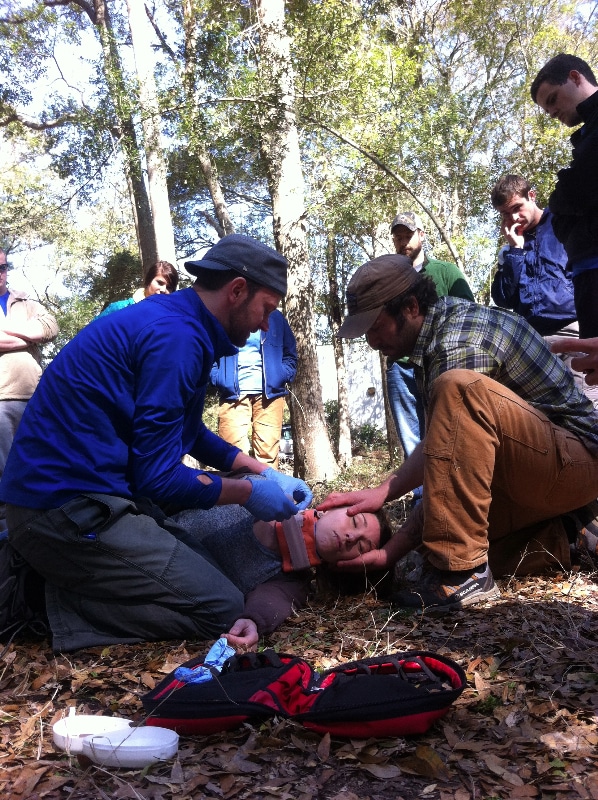 Working in remote settings has its challenges. From the lack of a quality connection to the Internet and having to find alternate ways to ‘go to the bathroom,’ to not being able to find a doctor precisely when you may need one, working remotely takes on all new meaning when you’re outdoor educator or backcountry wilderness guide. And while there’s nothing we can do for you here at the National Center for Outdoor & Adventure Education (NCOAE) about the Internet connectivity issue, we sure as heck can train and prepare you or your staff for medical emergencies that happen five or 500 miles away from the nearest hospital.
Working in remote settings has its challenges. From the lack of a quality connection to the Internet and having to find alternate ways to ‘go to the bathroom,’ to not being able to find a doctor precisely when you may need one, working remotely takes on all new meaning when you’re outdoor educator or backcountry wilderness guide. And while there’s nothing we can do for you here at the National Center for Outdoor & Adventure Education (NCOAE) about the Internet connectivity issue, we sure as heck can train and prepare you or your staff for medical emergencies that happen five or 500 miles away from the nearest hospital.
If you take a moment to really think about it, the practice of wilderness medicine has been around a lot longer than anyone really knows. We venture to say that its existence predates 1,800 BC, when the Code of Hammurabi first set out fees for surgeons and punishments for malpractice. Since the very first opportunity to provide lifesaving care in a remote setting, wilderness medicine has been a thing.
Of course, no one on the battlefields of Elam’s Invasion into Mesopotamia ever yelled for a ‘wilderness’ medic. Regardless, “the advancement of wilderness medicine has been closely connected to military exploration/operations throughout history, and not surprisingly, this remains in many ways as true today as it was a thousand years ago,” wrote George W. Rodway in a paper titled The Foundations of Wilderness Medicine: Some Historical Features.
Fast forward to 2015, and NCOAE — through its affiliation with the Wilderness Medicine Training Center — has emerged as a leading provider of wilderness medicine training in North Carolina (and as a custom training provider, anywhere in the world). More to the point, we’re the only provider to offer a Hybrid Wilderness First Responder (WFR) training and a Hybrid Wilderness First Aid (WFA) training, all under one roof. What’s this ‘hybrid’ thing we’re referring to? Good question. Read on, grasshopper.
For people interested in receiving training and certification in the administration of wilderness medicine but can’t get away from home or work for weeks at a time to participate in such trainings, hybrid training allows you to undertake and complete 30 to 50 hours of home study, complete with online exams. Once you complete the home study portion of the WFR or WFA training, you’re admitted to participate in practical training at NCOAE headquarters in Wilmington, NC. In the case of the Wilderness First Responder (WFR) designation, your time spent on campus at NCOAE is cut nearly in half — from nine (9) days to five (5). For the Wilderness First Aid (WFA) designation, your time is cut down from three (3) days to two (2) when you choose the hybrid (study-at-home) option.
We have a number of upcoming training opportunities for anyone who’s qualified, including:
- Wilderness First Responder (WFR) & Wilderness EMT Hybrid/DLP Training: Starts on March 9, 2015 (8 spaces are still available for this training and they tend to go fast). Learn more or register today by visiting the Wilderness First Responder (WFR) & Wilderness EMT Hybrid/DLP Training page online.
- Wilderness First Aid (WFA) Training: Starts March 20, 2015 (this is a ‘standard’ training, offered entirely on premises here at NCOAE in Wilmington, NC). Learn more or register today by visiting the Wilderness First Aid Standard Training page online.
We’re also the only provider to offer a 19-Day ‘Intensive’ EMT-Basic Training. Recognized by the State of North Carolina and credentialed through the North Carolina Office of Emergency Medical Services, this 19-Day training is just like the title suggests… intense and serious — and might we add, more affordable than you may think. Offered here in Wilmington, classes meet all day Monday through Saturday for 169 didactic hours, with an additional 18 hours of clinical and field practice built into the training.
The next training in this category kicks off in mid-February, but unless we receive cancelations, that training is already full. After that, the next EMT-Basic training — which still has a few slots left in it — is our April 6-24, 2015 event. Learn more or register today by visiting the 19-Day ‘Intensive’ EMT-Basic Training page online.
Like we said at the outset of this post, working in remote settings has its challenges, but with proper training from people who really know what they’re talking about, nearly anything the backcountry may present can be mitigated. Give us a call at (910) 399-8090 if you’d like to talk to us or ask questions about any of our wilderness medicine training options.
TALK TO US
Have any further questions about our courses, what you’ll learn, or what else to expect? Contact us, we’re here to help!
Leave a comment